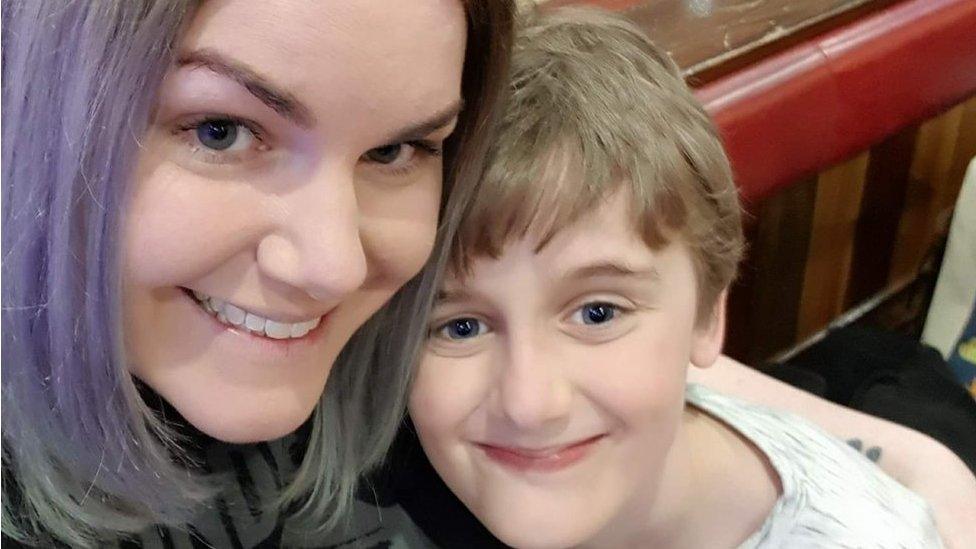Autism: 'Sending my son to Scotland will kill him and me'
- Published
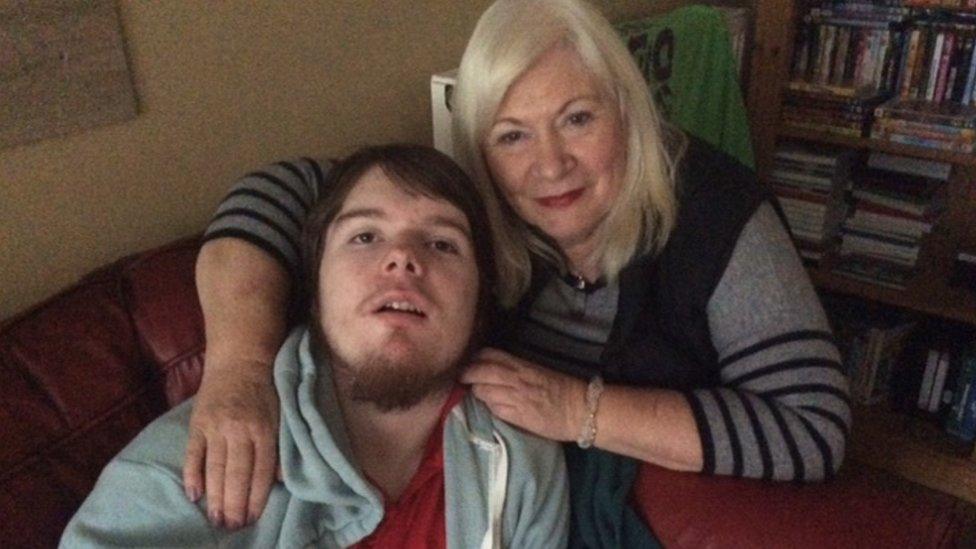
At home: Jill Grange believes her son is in the best place
"People with autism can be very violent and aggressive, but parents don't say anything because they are scared they will be taken away," Jill Grange says.
"They don't trust the care system and they are right not to."
Faced with autistic son Matthew, 20, being sent to an accommodation in Scotland, he is now with her in Bridgend.
She called for more help to stop families "falling apart" from the strain.
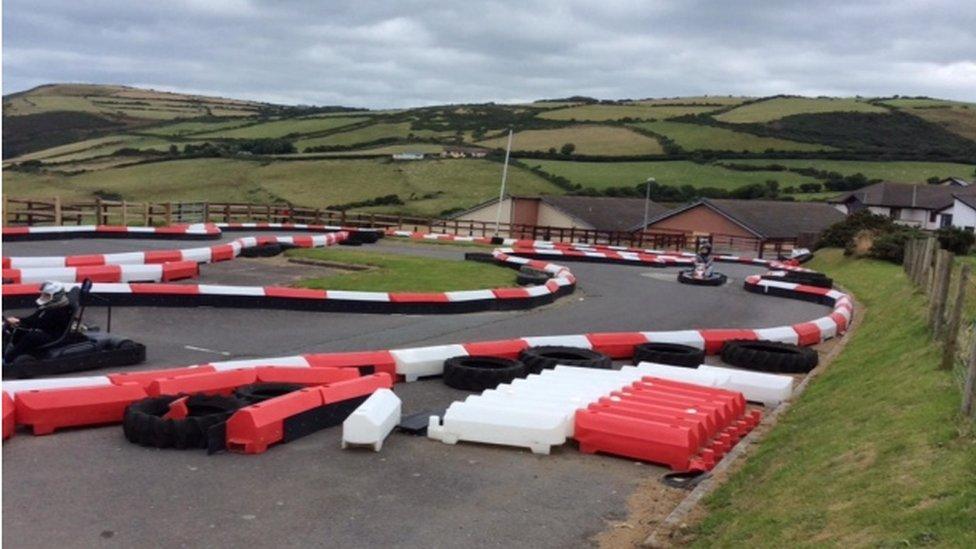
Matthew's favourite hobby is go-karting
My blood pressure shot up and I told them: "If you send him away, it will kill him and it will kill me too."
After 20 years of trying to find Matthew a suitable home, this is when I realised he had to be with me.
It was the only way because residential units are institutions, based on fear of whether it will work.
This would be about love.
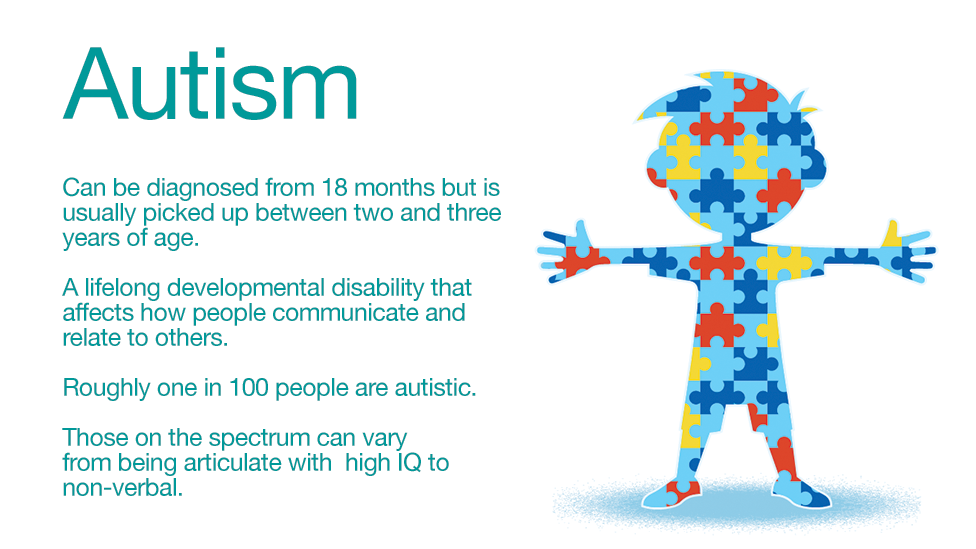
Matthew was born in Cardiff, but when he was six weeks old, we moved to Saudi Arabia, where I taught in an international school.
He seemed fine until 18 months to two years when he started limiting his food choices and had some sensory processing differences, such as he never liked light touch.
It was when I had a second birthday party for him and he wasn't interested in anyone but me, I realised something was wrong.
At three, his speech was gone.
It was then I brought him home to be assessed and a child psychiatrist said: "He's autistic and probably has been like it since birth.
"Here's a leaflet."
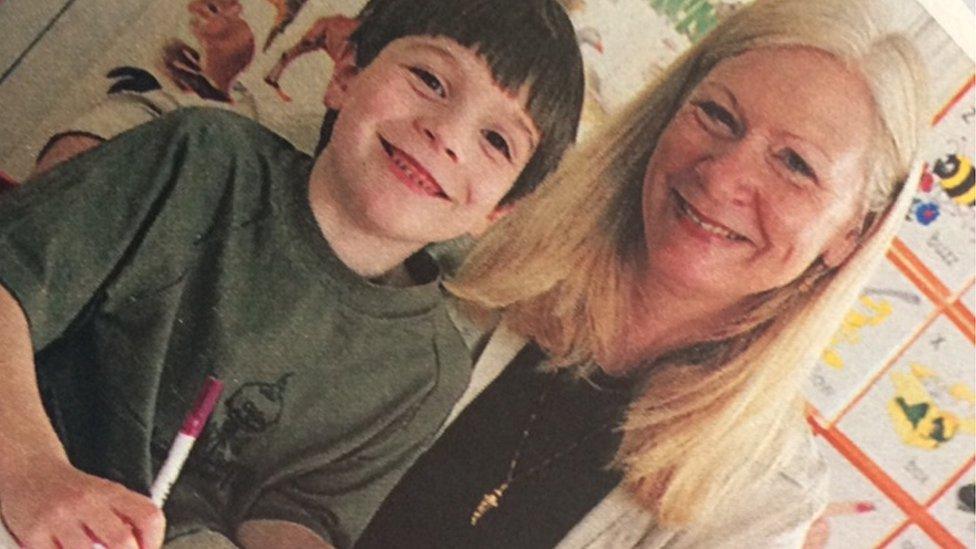
When Matthew was young, he was home schooled by his mother
Teaching English, there are standard measures where you can test ability for speaking, writing and reading, regardless of the person's native language.
I thought it would be the same for autism and they would tell me where Matthew is on the spectrum because people can vary from very articulate with a high IQ to non-verbal.
But to get a diagnosis tells you nothing about their function and how they perceive the world.
You find not much is known. That was 20 years ago and not much has changed now.
At six, Matthew was screaming all the time, and the GP wouldn't come and see him.
I found a bio-medical team in Hemel Hempstead which advised giving him natural supplements because his discomfort came from his body struggling to de-tox things properly.
You couldn't get this information on the NHS.
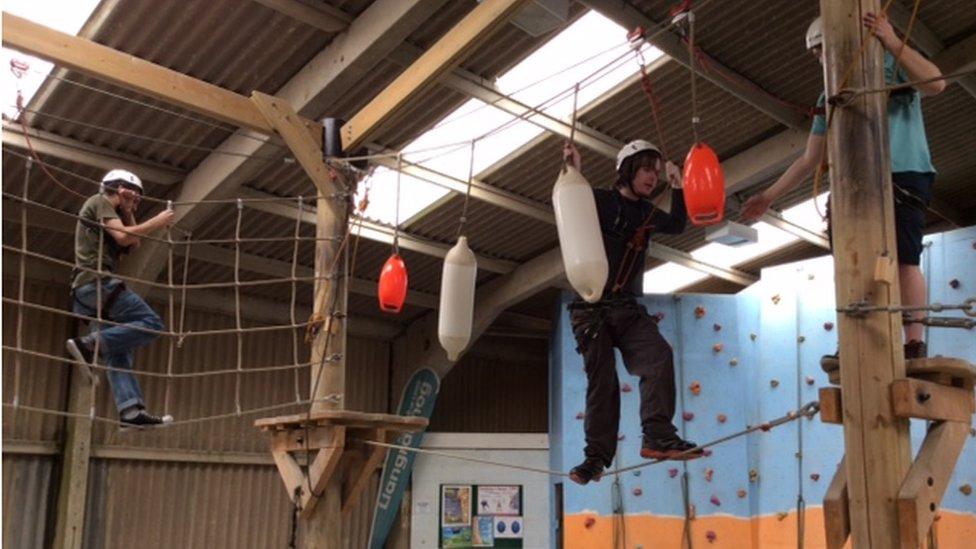
At an Urdd camp when he was young, Matthew on a rope bridge
Matthew didn't settle in primary school and his best placement was in a moderate learning difficulties unit.
But routine is very important and when a different person was with him every day, upsetting this, I decided to home school him.
A big thing is communication - idioms such as "it's raining cats and dogs" and "he kicked the bucket" make no sense and you have to think about what you say.
People with autism also practice echolalia - Matthew, for example, loved Life of Brian, and would repeat phrases from it in everyday life.
At comprehensive age, he went full-time to a special school, where he was doing fine until his epilepsy started at 13.
When he had a seizure, he would become aggressive, trying to grab people and they would lock Matthew in the central courtyard.
This extreme behaviour was linked to sensory overload and anxiety but no specialist seemed able to tie it all together.
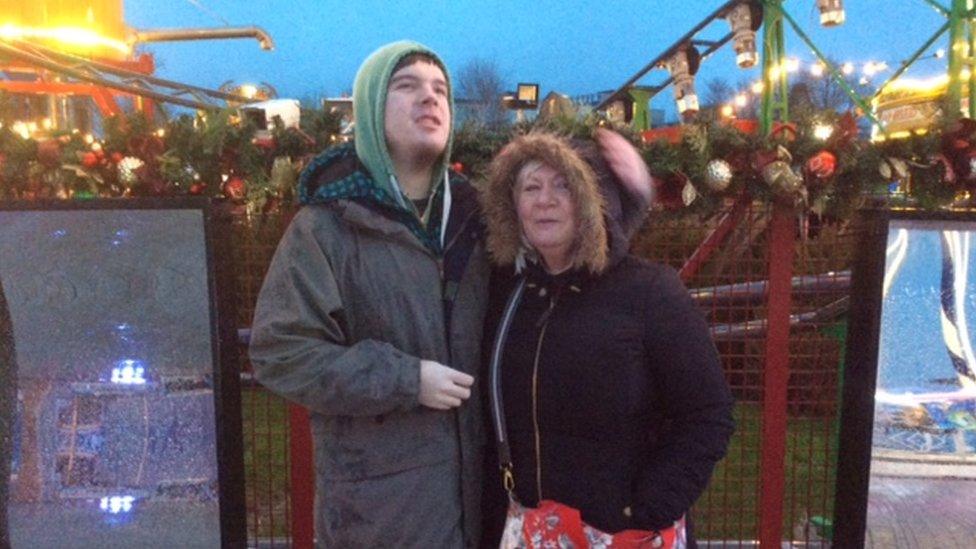
Ms Grange has Matthew at home full-time now and he does different activities each day with care workers
He also couldn't cope going to school and then into a separate respite provision and he trashed his bedroom.
A specialist said Matthew was hearing voices, but he was using echolalia to calm himself.
I had to Google "autism, puberty, seizures" to find out what was happening.
At 17, he moved into a new care setting, but when he came home on weekends, he would go berserk and have a meltdown because of the change.
It went on and I had to call the police because the social worker wouldn't do anything.
He then stayed there seven days a week for three years - I visited every day but because the staff turnover was so big, care really varied and there were times he was really unhappy.
A placement closer to home was found but he was incarcerated as there was nobody to take him out.
Matthew wasn't always fed, he was left lying in a wet bed, it was a nightmare time.
I didn't sleep for over a year, the stress was terrible.
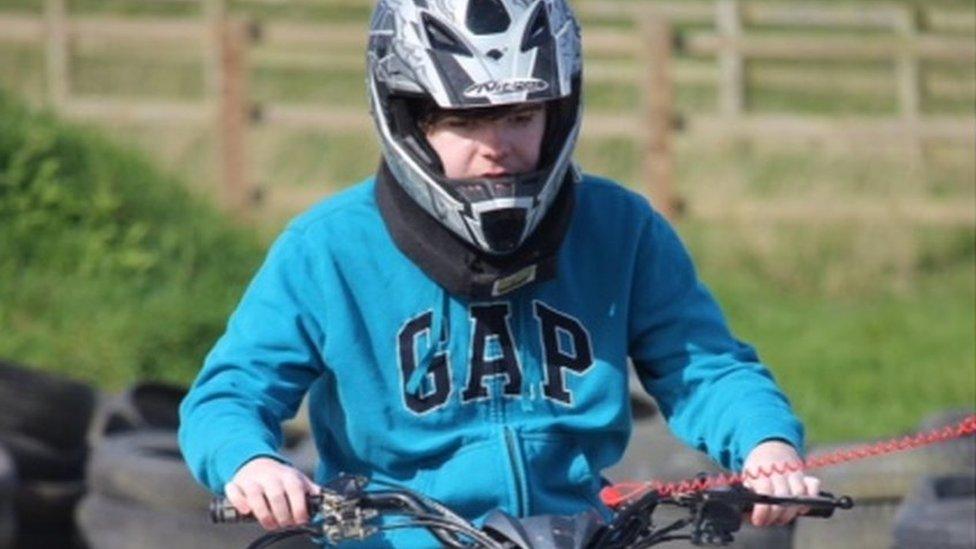
A hobby of Matthew's is riding bikes, quads and go karts
Nobody understands autism. They think there's nothing going on upstairs, but those with it are incredibly bright and they don't want to be sat in a care home watching people play bingo.
I called for Matthew to have a bespoke placement - this was when I was told the closest available was in Scotland or the north of England.
They don't realise how cruel they can be.
Matthew was becoming more and more insular, a care home was traumatic and was doing him no favours, so I decided I could do a lot better at home.
Services are stretched and it seems like there is no capacity for autism.
But it doesn't go away and the burden and hard work falls on parents because you don't want them to spend their lives in day rooms staring at walls.
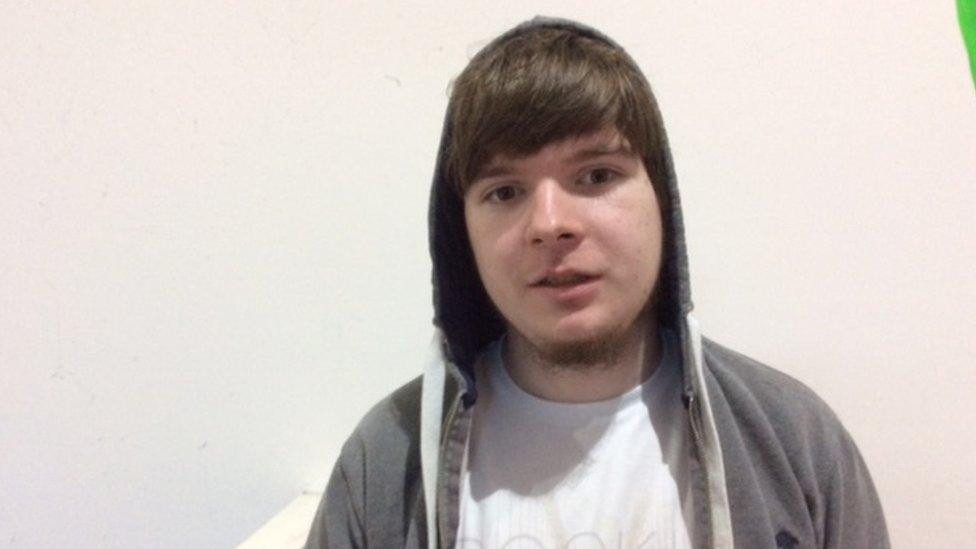
Care workers take Matthew out to take part in different activities
We are having to pick up the pieces and relationships are breaking down or families are giving up work and taking huge drops in wages because of the strain.
Nobody says sorry and it has left me emotionally traumatised.
I think care packages tailored around young adults living at home are the future.
Six months in and it is working. Because I am determined but also because it is based on love.
- Published12 August 2018
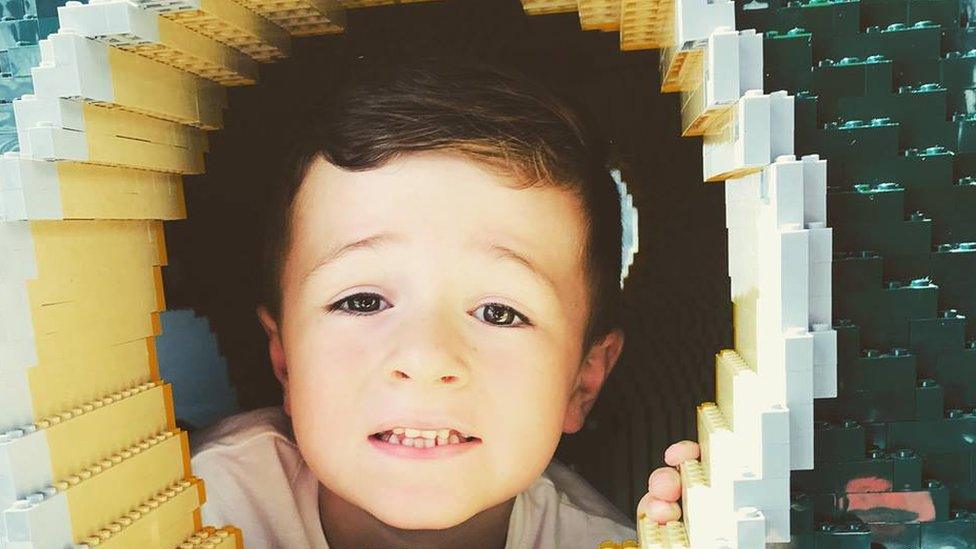
- Published27 September 2018
